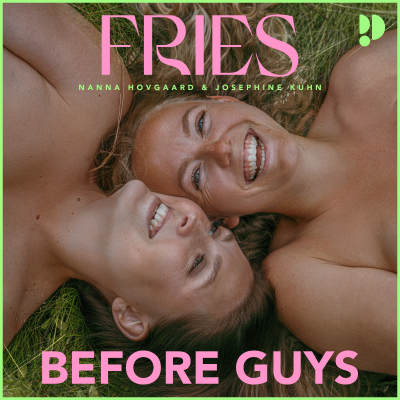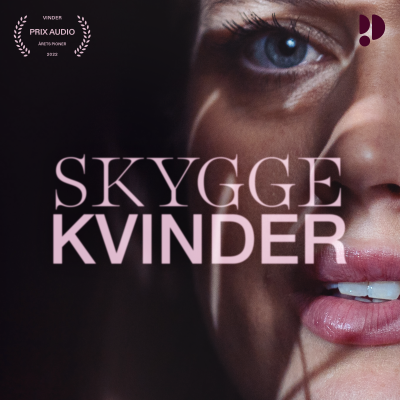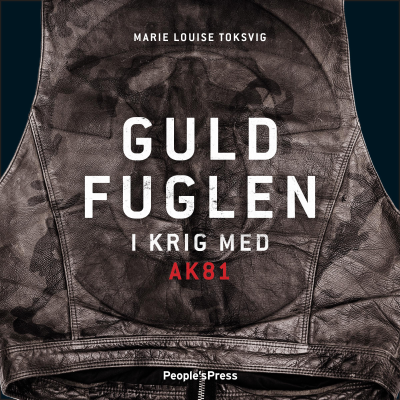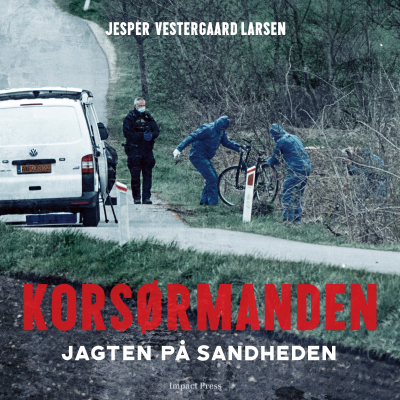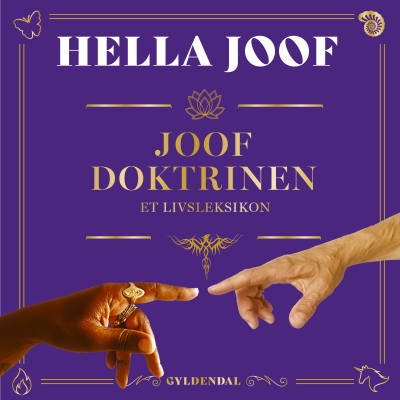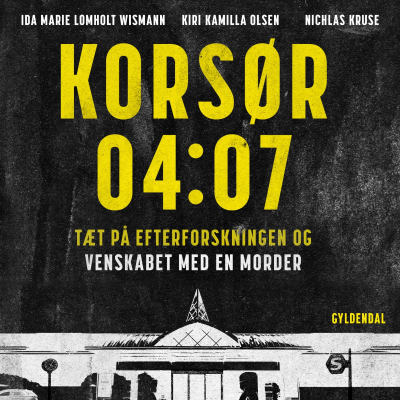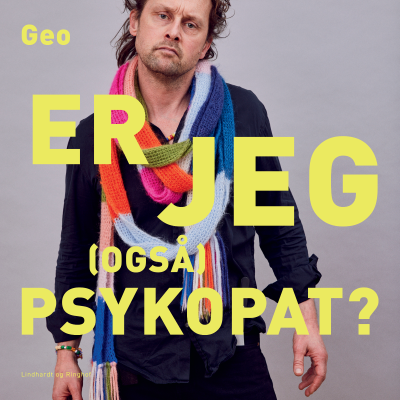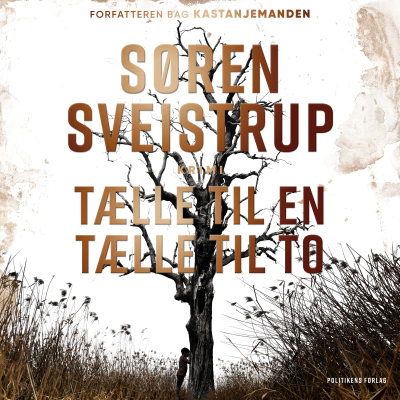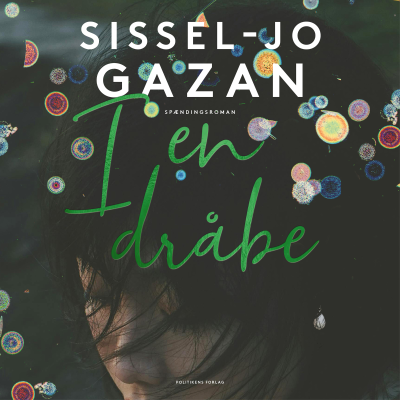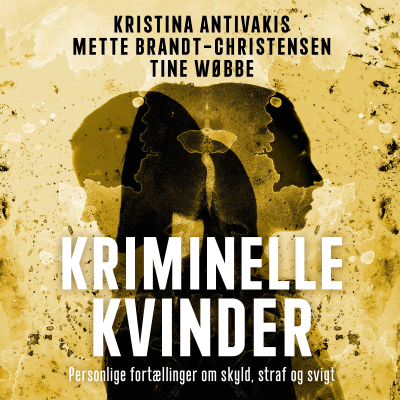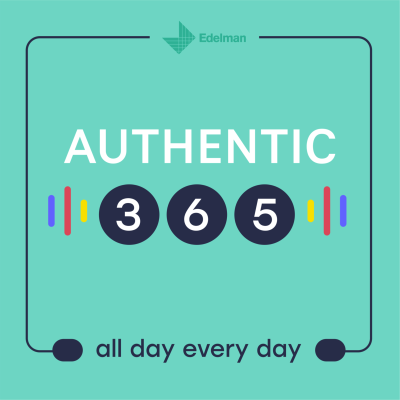
Authentic 365
Podcast af Edelman
Authentic 365 provides a glimpse into how some of the most inspiring people show up as their authentic selves and make magic happen each day. In each episode, Edelman hosts will go deep with global creatives, communicators, troublemakers, movers and shakers and others who live their truths fully, to find out how they bring their personal missions to life
Prøv gratis i 60 dage
99,00 kr. / måned efter prøveperiode.Ingen binding.
Alle episoder
11 episoderAuthor, Vice President of the GLAAD Media Institute, and Lutheran Deacon Ross Murray joins Edelman's Gurpreet Brar and Faith McIver in conversation to discuss his life and experiences as a spiritual person within the LGBTQ+ community. ___ GLAAD said about Ross's recent book Everyday Advocate: Living Out Your Calling to Social Justice [https://glaad.org/ross-murray-glaadinstitute-vice-president-releases-his-second-book-everyday-advocate-living-out/]: "Drawing on his own experience, Ross encourages readers to discern their own call to advocacy, learn to identify injustices and respond faithfully by incorporating big and small actions into their everyday lives."
Dani D'Amico, McKinsey & Company New York Partner, joins Christiane Schulz, Edelman Germany CEO and GWEN (Global Women’s Equality Network) Lead, in conversation on an Authentic 365 Pride Takeover. USA Today recently reported that a review of leaders at America's 1,000 largest companies found that just 10 out of thousands of named executive officers identify as part of the LGBTQ+ community, underscoring the importance of increased representation. In this episode, Dani shares her experience as a transgender woman navigating a corporate leadership role and what it means to be a role model for future transgender executives.
On the Frontlines for Trans Rights: A Conversation with Rep. Zooey Zephyr and Journalist Erin Reed Edelman’s Lauren Gray [https://www.linkedin.com/in/laurenlgray/] (she/her/hers) and Lou MacAfee [https://www.linkedin.com/in/loumacafee/] (they/them/theirs) will host this episode, uncovering what it means to be on the front lines advocating for trans rights in the United States with Montana State House Representative, Zooey Zephyr (she/her/hers), and LGBTQ+ Journalist, Erin Reed (she/her/hers). ____ Representative Zooey Zephyr identifies as transgender and, in a recent high-profile incident that sparked controversy, was censured and banned from the House floor [https://www.youtube.com/watch?v=UqB5wipYqLM] after speaking out against a bill that would ban healthcare for transgender youth. Erin Reed is a leading transgender journalist who writes for Erin In the Morning [https://www.erininthemorning.com/] and recently wrote an influential point-by-point rebuttal [https://www.erininthemorning.com/p/missouri-anti-trans-whistleblower] in response to the alleged Missouri whistleblower on transgender healthcare.
This episode of A365 will discuss religious acceptance in the workplace and how we can all recognize various faiths in a respectful and inclusive way. Isabel Wong (Hong Kong) will lead the conversation with Eboo Patel, Founder and President of Interfaith America to address understanding and embracing different religious identities in the workplace, and how people and organizations can be more inclusive and supportive of diverse religions around the globe. Authentic 365 – Faith at Work Isabel Wong [00:00:00] Hi, I'm Isabel Wong with Edelman, currently based in Hong Kong. Now for this episode we are going to have a deep dive into the topics of religious acceptance, best practices in the workplace for interfaith dialog, and how religious identities are very much part of the broader diversity and inclusion conversation. And joining me for this conversation is Eboo Patel, founder and president of Interfaith America. Eboo is also a former faith advisor to President Barack Obama. So, Eboo, thank you so much for joining us from Chicago. It's great to have you with us on the show. Eboo Patel [00:00:40] Isabel, it's great to be with you. Thank you for having me. Isabel Wong [00:00:43] Thanks for joining us. Now, before we kick start the deep dive conversation, in order to set the scene right, I would like to have you help us understand and give us a brief introduction to our international audience about the work that you do at Interfaith America. Eboo Patel [00:01:01] Sure. So about 25 years ago, I founded an organization called Interfaith Youth Core. Actually founded it when I was a graduate student at Oxford University. And we ran programs all over the world. And the big idea was that, we should, it was going to strengthen the global fabric to bring young people from different religious identities together, to discuss the shared values between their faiths and to act on those positive values like compassion and hospitality and service. As the organization developed, we rooted it in the country in which I'm a citizen of the United States, even though I was born in India and educated in part at Oxford. I'm an American citizen. I've grown up here. I feel most comfortable in this culture and the organization as we would have here in the big idea of the organization whose name is now Interfaith America, but which started as Interfaith Youth Core, is that religious diversity can be a great strength of a nation in a world if faith is a bridge of cooperation and not a barrier of division or a bludgeon of domination. That's the case at city level, at the national level, and certainly also at the company level. And I'm excited to talk to you, Isabelle, about how positively and proactively engaging religious diversity can strengthen the fabric at both Edelman and for Edelman's clients. Isabel Wong [00:02:27] Mm hmm. Yeah, I do very much look forward to our discussion as well. And I know that for this conversation, we are going to touch on the concept of religious diversity and also religious acceptance. So I just want to get your help to help our audience understand the concept of religious acceptance as well. And why is this so important? Eboo Patel [00:02:48] Sure. So so religious diversity is just a fact of our world and a fact of most nations in the world. Meaning that there are people from different religious identities who are living in close quarters together, whether that's in the United States or in India or Brazil or Australia or the United Kingdom or Morocco or South Africa. Anywhere in the world you have people from different religions living together, working together, studying together, playing on sports leagues together, etc.. We don't talk about religious acceptance at Interfaith America because we don't ask people from one religion to accept the doctrine of another religion. It's not about acceptance. It's about cooperation. The idea is not that that Muslims who believe that Jesus is a prophet of God, but not the son of God, should accept the Christian doctrine about Jesus. The idea is that Muslims and Christians should cooperate positively. So we speak of religious diversity, should give rise to interfaith cooperation where faith is a bridge and not a barrier. Isabel Wong [00:03:58] Yeah, I do very much agree with that as well. And the very foundation of it is also fostering a sense of, you know, ability to appreciate spiritual values, beliefs and faith based practices. You know, there are different from opposed by removing prejudices and stereotypes, which is very much the kind of work that you do also. And it requires mutual respect. Now, I would like to take a deeper dive into embracing religious diversity at work, because obviously when it comes to this topic, a lot of people would just be thinking, how can we really do that? And for authentic 365 this podcast, the kind of conversations that we create, are all about how can one really bring oneself authentically to work. And in our view, one must also feel comfortable to show all sides of himself or herself that includes one's religious identity, because religion is very much an essential part of personal and community identity. So. Eboo, from your perspective, should we speak about our religion, our faith at work? And if so, what is an authentic way to approach it? Eboo Patel [00:05:10] Sure. So, Isabel, I'm in a slightly adapt the question, and I'm going to say that I think it's important for any company, for for employees to feel like they can bring their best professional self to work and that that company is able to serve its clients and its customers and the community in which it is and in the best possible way. So the question for me is not can you bring your authentic self to work? I appreciate that. That's the question of this podcast. That's not my principle question. The principle question is, can you do your best work at work? And if you are Jewish and keep kosher and there is always a mixing of meat and cheese and there's never any kosher food available, you might not be able to do your best work if you are Hindu and are vegetarian, and there is meat in every dish at the cafeteria at work. You might not be able to do your best work if you are Muslim and you don't drink alcohol on account of your faith. In every social event at work involves copious quantities of alcohol, you might not be able to do your best work. And this is why it's important for a company to positively and proactively engage religious identity when it comes to their employees. To ask the question, can employees from different faiths do their best work here? Are there are we do we have an environment that is respectful of people's diverse religious identities? The framework we use that at my organization, Interfaith America is respect, relate, cooperate. Do you have an environment that respects the identities of diverse people, that encourages positive relationships between them, and that facilitates cooperation on common projects? The beautiful thing about companies is that the common projects are obvious, right? The client work that you're doing, the creative work that you're doing, the initiatives and campaigns that you're working on at Edelman, those are obvious. And so you have a shared project to encourage cooperation. And I think this is one of the reasons that companies can really be leaders in interfaith cooperation efforts, because you naturally have employees from diverse religions present. You naturally facilitate positive relationships through a close environment, and you have shared projects in which to encourage cooperation. There are many parts of who we are which are totally legitimate but but are probably not the best fit for the workplace. And what comes to religious diversity? A good example of this is conversion. It's perfectly legitimate for Christians or Muslims or somebody from a different religious identity or in fact a philosophical worldview like atheist who seeks to bring other people to their faith or worldview. It's a perfectly legitimate activity, but that's not what you want happening at a workplace. The question is how do you engage religious diversity in a way that encourages people to bring their best professional self to work again? People should be able to wear clothes that are appropriate for their religious identities. People should be able to eat the food that is required by their religious identity. People should have a place to pray. If they need to pray, they should have the appropriate days off if they need to take days off for religious holidays, etc. That's a positive and proactive engagement of religious diversity at work that encourages people to bring their best professional self without inviting dimensions of their identity, which are perfectly legitimate in other spaces and churches or mosques or temples, but not appropriate at work. So I would I would offer a framework that is different from authentic self or wholesale. I would offer best professional self. Isabel Wong [00:08:51] Mm hmm. Yeah. I really like how you mentioned that. And essentially, religious beliefs inform a person's identity, way of life and everyday activities and behaviors. And religious diversity can essentially make a workplace really inclusive in the sense of allowing opportunities for everyone to, you know, work through biases. And then essentially it will come into this positive impact that would result in diversity of thoughts, freedom of choice of beliefs and expressions. Now, obviously, when it comes to introducing and creating a safe space for religious diversity, it it has its challenges. So through the years that you work in this space, what are some of the common challenges that you've seen when there are multiple and diverse faiths represented in the workplace? Eboo Patel [00:09:41] I think the first thing to say is that in virtually every workplace, when we're talking about the corporate environment, particularly in multinationals like Edelman and the kind of companies that that our clients development, you're going to have religious diversity naturally. You're going to have Muslims and Jews and Christians and Hindus and six and behind and Buddhists and atheists. You are naturally going to have religious diversity. And those people from different religions have important disagreements. They have disagreements a doctrine like the nature of Jesus and the disagreements and ritual practice, like what is permissible to eat. Many Hindus don't eat meat at all. At all. And of course, many especially don't eat beef because of that, the role that cows play in the Hindu faith. Muslims, on the other hand, not only eat meat quite regularly, but actually do it as an important part of several of our rituals, including Eve. That is a simple that is a simple fact that that's a disagreement, pure and simple. The important thing about religious diversity and other dimensions of diversity is to not pretend that differences and disagreements don't exist. Of course they exist. It's to say that those disagreements and differences are not going to prevent us from working on other important projects. I think a company has this opportunity, the ability for people to disagree on some fundamental things like doctrine and ritual practice, and yet work together on other fundamental things like campaigns, initiatives and projects that are essential to the mission and success of the company. Isabel Wong [00:11:20] Mm hmm. Yeah. And I like how you just mentioned there that disagreements could be expected in different forms, and they don't have to be viewed negatively. Now, obviously, in light of the recent events that put anti-Semitism in the spotlight, the Wilders remind you that religious intolerance and ignorance can cause great harm. So I want to get your perspectives on, you know, how should businesses act around these conversations, right? Should they be taking a stand? And if so, how can they do this more strategically? Eboo Patel [00:11:56] So you want your you want your employees to feel safe and welcome. Right. And when there is a very public and ugly rise in anti-black racism, as in the case of the murder of George Floyd or anti-Semitism, as has recently happened in the United States with comments by Kanye West and others, it very naturally makes some people, people of that particular identity feel hurt and marginalized and upset. And so that is not good for a company. I also think that companies. Should, generally speaking, not be taking stances on everything. You just can't do that because the world is a place of 8 billion people and there are always going to be conflicts and there's always going to be injustices. And you can't be in a position of of fielding a thousand different petitions a day and deciding which ones you're going to send a tweet out about or send a statement out about. I think that a company ought to decide which items impact its employees, its customers and its mission. So if an anti-Semite is one of your clients, unless you are a law firm defending their First Amendment right, you should think very hard about what you want to do about that. If that person is proactively spreading an ugliness and a bigotry that hurts lots of people, including your employees and your other customers. Again, if you're if you are in the free expression business, I think that the I think that that question might be fielded a bit differently. But broadly speaking, bigotry is a bad thing for business. It's a bad thing for society. It's a bad thing for your employees. It's a bad thing for your customers. Companies should steer clear of that and do it in a way that doesn't that doesn't sign you up for making a statement about every issue on the planet. Isabel Wong [00:14:20] Hmm. Now I want to get your perspectives and insights into some of the best practices, because you previously served as a former faith advisor for US President Obama. Can you talk about some inclusive faith practices that you shared with Mr. President or other global leaders that you've worked with? You must navigate leading complex social structures and human landscapes that could include religious beliefs. Eboo Patel [00:14:48] Sure. So I'd like to talk with President Obama and everybody from people who lead local churches to two people who lead global multinationals. I like to tell them that that we should think about diversity, work through the metaphor of a potluck supper. A potluck supper is is an event in which the food is not provided by the host. The host instead provides a space where people bring their own dish. And the thing that I love about a potluck is that a potluck only exists if people make a contribution, if people bring their dish. Right. And so you want this at work. You want your employees to come to work as if it's a potluck. You want them to make a contribution, their gifts and their talents and their efforts of their energy and their labor. That's what makes a workplace work, is when people bring their talents, bring their dish. You don't want everybody to bring the same dish. You don't want to you don't want a potluck of only biryani or only months off or only tacos or only casseroles. You want a diversity of dishes? That's what makes a potluck delicious and interesting and flavorful. And actually, it's not just the array of dishes that help a potluck be wonderful. It's the combinations between them. It's when somebody is crusty. Bread recipe from Eastern Europe goes just perfectly with somebody else's spicy dip from the Middle East. And so a company works well when it is inviting the contributions of diverse people and creating a space where creative combinations can exist. A company ought to be aware of the barriers to some people's contributions. Sexism, racism. Homophobia, Islamophobia. Anti-Semitism. These are bad because they are not only violations of individual dignity, but they are also barriers to people's contributions. There's anti-Semitism in your workplace. Jews are unlikely to be able to bring their best dish if there's Islamophobia in your workplace. Muslims are unlikely to be able to bring their best dish. So reducing barriers to people's contributions is a good thing. And the other thing is you want people to take responsibility for the whole space. The host can't do all the work and a potluck can't do the setup and the clean up and be responsible for getting the conversation going. The community has to do some of that work. Some people have to show up early to do the setup. Some people have to stay late to do the cleanup. Everybody's got to take responsibility for making sure that that the safest space, the space is safe and that the conversation is healthy. So I like to use the metaphor of a potluck supper when talking about diversity work, including religious diversity. Isabel Wong [00:17:35] Right. And a follow up question for that is, you know, when it comes to this interfaith. I look right. People with different religious backgrounds, like you mentioned just now. I expected to bring their dishes to the table. Do you think atheists and agnostics should join these conversations? Should they be bringing the dishes to the table as well? Eboo Patel [00:17:54] Oh, of course. Of course. I mean, that's not even that that's not even, you know, a controversy or a moment of pause. People of all faiths and philosophical worldviews are welcome. You absolutely want people who are atheist or agnostic or spiritual seekers or in between religions or whatever it might be to feel like they can do their best work for you at work. You want to be able to have clients from Zoroastrians to atheists, so to speak. And so, you know, we, we tend to call issues about religious diversity. We tend to use the language diverse orientations around religion, which means everything from the different kinds of Muslims in the world, Sunnis and Shias and Sufis, for example, to to people who who don't have religious belief at all and orient around religion as nonbelievers. So that's our kind of formulation that that we believe is more inclusive of atheists as diverse orientations around religion. Isabel Wong [00:18:57] Yeah. Indeed. The conversation is all about, you know, trying to understand each other, not really to challenge or dispute. So that's a very important mind set that we should all remember. Now, I would like to take a slightly reflective lens on, you know, the work that you've done over the years and ask about your experience, you know, working in spaces inclusive of all faiths, you know, how has that that work really impacted your faith and your connection with others and vice versa? For example, how did those connections inform the work that you do over the years? Has it evolved? Eboo Patel [00:19:33] Yeah, that's a great question, Isabel. So I've been doing interfaith work for 25 years, 20 of them professionally. In fact, my organization had just celebrated its 20th anniversary. And and I do interfaith work in part out of my own commitment as a smiling Muslim. The Koran says that God made us diverse nations and tribes, that we may come to know one another. There are many examples in the life of the Prophet Muhammad made the peace and blessings of God be upon Him, where he had positive partnerships with people of diverse faiths. In fact, he invited Christians to pray in his mosque, for example. And so there is a muslim inspiration for me to do interfaith work. And absolutely, the people that I engage with from different religions, I learn from their faith. I'm inspired by by their by their faith and their commitment to their faith, even when I don't fully agree with their doctrine. And so the word interfaith actually encapsulates much of the meaning of our effort here. Inter means the interaction between people from different traditions. Faith means one's own relationship with one's religious tradition. And so interfaith is about how our faith guides us to have better interactions with people from other religions and how those interactions with people from other religions actually strengthen our faith, our our relationship with our own religion. Isabel Wong [00:21:01] And I know that you run your own podcast and on your show you like to answer the question, how does our religious understanding of the world inform how we live and work together? Would you please answer that question for us today? Eboo Patel [00:21:15] Sure. So I think that the center of Islam is about mercy and monotheism. It's about believing in one God and that that God creates all of us. And our common ancestor is is Adam prophet. Adam, who who is the the the father of us all. And so there is kind of a human family feeling in that. And so that's a really important part of my of of my faith is the idea that that I am inspired by my faith to positively engage with diversity and do interfaith work. Isabel Wong [00:21:50] And I know that you are an author of multiple books, and this year you also launched a new book. Congratulations, by the way. And it's titled It's We Need to Build Phenix for Diverse Democracy. Can you speak to what the book is about and what readers can take away from it, obviously, without giving away too much? Eboo Patel [00:22:08] Sure. Well, I do hope that I appreciate you asking about my book, We Need to Build, and I hope that your audience here is interested in it. So a lot of my book is about a positive and constructive engagement with diversity. It's about how our societies can feel like potluck suppers that welcome the distinctive contributions of diverse people and in in facilitate creative combinations and enriching conversations. I don't like the melting pot. Hot metaphor for diversity. And I don't like the battlefield metaphor for diversity. I much prefer a potluck supper. I write about that a lot in my book, and I write about constructive approaches to social change. Social change is not about a more ferocious revolution. Social change is about building a more beautiful social order. And we need to defeat the things we do not love by building the things that we do. And one of the things that I admire about the private sector is, is the manner in which you you do and have the opportunity to build strong institutions which elevate people, both your employees and your customers, and hopefully the communities and societies that you live within. And so there there are lots of examples in my book about how nonprofit institutions do this because I'm part of the nonprofit world. And I also believe that companies have the opportunity to do this as well. Isabel Wong [00:23:34] And finally, to wrap up this conversation, we normally ask every single guest of ours on authentic 365 this one question, Eboo, how do you define authenticity? Eboo Patel [00:23:48] Well, for me, it's it is being honest with myself about what inspires me and trying to live that inspiration out in the world. And I'm inspired by diversity work and I'm inspired by constructive approaches to social change. I'm inspired by religion, and I'm inspired by my own faith. And I'm inspired by improving people's lives. And so and so that for me is is my authenticity. And I'm proud to I feel very blessed that I'm able to live out much of that in my life and inspired by my kids and my wife and my family and and having a balanced life between work and family and faith and community and recreation, that's that's also part of an authentic life for me. Isabel Wong [00:24:31] Yeah, definitely. If we want to be inclusive, diverse and comprehend how we relate to each other, we need to continue to expand our understanding of different cultures values, and that includes various religions, beliefs and practices. That was a fascinating conversation. Thank you so much for sharing your time and insights with us. Eboo, It was a pleasure. Eboo Patel [00:24:53] Thank you so much, Isabel.
This episode of A365 will discuss gender expression and identity in the global workplace. Rafael Franco (Brazil) leads the conversation with Edelman leaders to address several topics, including understanding and respecting pronouns, recognizing differences in inclusive language globally, navigating gender expression in the workplace and more. The episode will also explore the experiences of those within the LGBTQIA+ community in sharing their identity at work and in the world. Transcript Dani Jackson Smith [00:00:01] It's who you are to work after hours and back at home. Exploring every layer. Finding out what makes you uniquely you. And letting that shine back out into the world. It's authentic. 365 A podcast that takes a glimpse into how some of the most inspiring people among us express themselves and make magic happen. I'm your host, Danny Jackson Smith, VP at Edelman by day, community enthusiast and lover of the people always. On this episode, we are engaging our colleagues across the globe in a conversation on gender identity, understanding that how gender is addressed and acknowledge shifts based on your location. Let's join the conversation now. Rafael Franco [00:00:51] Hello. I'm Rafael from Brazil, Adama San Paolo. And we're here today to discuss to explore the stigmas around gender identity and expression, to go beyond the binary gender identity and expression at work. And for this conversation I have here, for different persons around the globe, we have Monika Tik Tok from Brazil whistles. She's a senior account manager. I will ask everyone to say your pronouns as well as tragedian director from Malaysia. Lauren Gray, Senior Vice President, New York Crisis and Reputation Risk Advisory. And Nick Nelson, Senior Vice President Austin. Welcome, everyone. Nick Nelson [00:01:34] Glad to be here. Monica Czeszak [00:01:36] Happy to be here, too. Rafael Franco [00:01:38] So we just start with an open question to everyone. So one identity is important to us all, and should we be respected by everyone knowing the formal definition of gender identity and expression? What do those terms mean to you personally and your response? Again, please say your personal pronouns. Mo, you can you can start, please. Monica Czeszak [00:02:03] Okay. Hi, everyone. Glad to be here. If everyone, I'm Monica. But let's see Mo for short. As you heard, my name is a little tricky. My pronouns are actually all the pronouns. And like the lady on the mall, that puts everything on the shopping carts. So he / she / they I'm comfortable with all of those. And to me, that's a special question because expression to me it's whatever I feel like that day. Sometimes it's braids, sometimes it's baggy clothes, sometimes it's nothing at all. I'm also very forth on getting out of that image that everyone that's nonbinary only wears pajamas. And I think expression is just feeling comfortable with yourself and being your best self every day, and that's particularly special at work. And I think respect only starts with us looking at each other and getting to know each other and asking questions and having safe spaces to ask those questions because it's not easy. Sometimes I'm very feminine, so people might assume I use she or her. Sometimes I'm very masculine, so people might assume similar he. But it's very fluid like gender and like expressions. So we have to be safe to ask each other questions and present ourselves as we are. Rafael Franco [00:03:28] Okay, great. What about you, Asra? Ezra Gideon [00:03:31] So yeah, my pronouns are he / him. I've recently transitioned from female to male about two years ago. And I guess, you know, I'm. How do I say this? It is more true to me being a he / him than it ever was before, you know, being in any other pronoun, to be honest. So it's most comfortable for me and this is the pronoun that I feel most myself. It's a little tricky here because the Malaysian language does not have a he / him / they / them, its all dia means they / he / she. So it's you know, it's it's an amazing language. Trouble is, in Kuala Lumpur, corporate language is still English. So but it's still kind of, you know, a yeah, there's a mix of of Malay and English. So it's it's not as difficult, I think, for us here in Kuala Lumpur as opposed to parts of other parts of Malaysia. But yeah, it's a it's those are the pronouns I'm comfortable within and I'm happy to to use whatever pronouns someone tells me they want. I will use that because I respected that, that they know themselves better than I do. So, you know. So, yeah. Rafael Franco [00:04:52] That's great. Well, I'm making myself vulnerable here because I'm not a known non-native English speaker. So it's hard for us Brazilians as well to understand this gender way of speaking in English. So I will hand over to my English colleagues. My English speaker, English- speaking colleagues learning and make plays well. Lauren Gray [00:05:17] Thank you so much. I actually wanted to start by just sharing a definition of gender identity and gender expression, just in case anyone who's listening in doesn't know those definitions. And these come from the LGBTQ+ advocacy organization GLAAD and its media reference guide online. Reporters can use that guide to help better understand and cover LGBTQ issues. For gender identity, it's really a person's internal, deeply held knowledge of their own gender. Everybody has a gender identity. For most people, it matches the sex that they were assigned at birth. For our transgender community members, it doesn't align with sex assigned at birth. And many people's gender identity is that of a man or woman. But for other non-binary community members, it just doesn't fit neatly into one of those two categories. And just to give you a little bit more context on that, there was a recent study by the Trevor Project that found that one in four Gen Z LGBTQ community members are non-binary with an additional other 20% questioning their gender identity, and one half of those Gen Z non-binary individuals actually don't identify as transgender. So what we're seeing is really a sea change in the breadth and variety of language that's being used to describe and understand how nuanced gender can be. For me, my pronouns are she her, hers. But as a member of the LGBTQ community, hearing people share their pronouns and seeing pronouns included in emails, signatures, or in zoom display names. It's really a signal of a more diverse, inclusive environment. And I think it's one of the very important things that our colleagues can do in the workplace as an outward sign of support for our community and for those who are also looking for other ways to be a stronger ally. I would encourage you to get to know your LGBTQ colleagues, acknowledge their partners or spouses or families in the very same ways that you would people outside of the LGBTQ community and read up on things, look at the news, watch what's happening as things develop, and try to acknowledge moments of significance to the community, moments when you have terrible setbacks and moments when we celebrate great progress. Nick Nelson [00:07:38] Nick Yeah. Lauren Thank you so much for that. I think, you know, it's always helpful here and be reminded of my pronouns are he is and my name is Nick Nelson since I didn't start with that. I think one of the things that I am still learning is the conversation we're having right now. You know, I work in multicultural DEI space, and so I've had the privilege to learn about gender identity, gender expression, but I've also had to acknowledge my own privilege as a gender male and not having to understand people who don't identify in the same way. And it's been a really rewarding experience to learn so much and have conversations like these and facilitate conversations like these for clients and for our colleagues. And so I think what it means to me is just a learning experience still. You know, I'm 33 years old and I'm still learning so many things as if I was still in school. And I think that's been the great thing about this particular workplace, but especially the work that I do is it gives me an opportunity to educate and to bring clients and colleagues along on the journey with me. But it also provides an opportunity for me to learn more and then be more supportive of my colleagues who may not be who may not identify it the same way or feel confident or comfortable identifying the same way as I do. So I'm really glad to be in this space with you all and have this discussion because it's long overdue and it's always important to talk through and kind of hear the perspectives. And I am looking forward to walking away from this with a new perspective that I can then bring into my work and support everyone, you know, regardless of their walk in life. Rafael Franco [00:09:35] And we have mentioned our journey to understand this this theme better. And also Lauren mentioned the pronouns on our email signatures. And this awake me about Monica because I have wrongly assumed her pronouns in the beginning as she / her only. And we never have talked about that before. So Mo, is there a best way to to make sure we are always using pronouns properly and inclusively, especially in a global firm like Edelman? Monica Czeszak [00:10:12] Yeah. And I think that's the funny part because when you have different problems, sometimes it falls back to you to let people know about your names, but you're not always safe or comfortable with sharing. So when you have a widespread initiative like the email signatures, like Lauren said, you're showing other people that it's okay to introduce yourself and say your problems and ask people for their problems as well. To me since I relate to all of them and none of them. It's like whatever rings that they it's fine. I feel very glad when someone uses he for me because it shows me they're trying to use other problems with me or when they talk in a general neutral way, but at the same time I'm comfortable in all those spaces. So I never really made the effort of going out there and saying to people, Hey, this is my problems and I'm comfortable this and comfortable with that. And once we had the signatures, it was like, Oh, I can let people know. And it kind of blew my mind a little because it was so simple and so easy. And at the same time I had a few emotional exchanges. Rafael was one of those people, but other colleagues came to me and was like, Oh my God, I'm so sorry. I never knew. Are you okay? Should I say things different? And it never occurred to me before that people might be struck that way after knowing my problems, that they did something wrong or something was not right before. So I had a lot of very emotional and very good exchanges with my colleagues, and I tried to make sure they knew that it was okay. We were getting to know each other better and I was happy. Now they knew and they were trying to be more. I don't know, inclusive of me. And it was very good for me to have those conversations because it opened doors for us to know each other better. Go ahead, Nick. Nick Nelson [00:12:22] Yeah. I just wanted to build on that one. Thank you for sharing. But too, it's something that I speak about in client forums and in our employee forums where inclusion or being inclusive is not difficult, but it is intentional. So using the email signature was such a simple thing that started these conversations and got you such reactions, but also gave you an opportunity to express that. That's a perfect example of that. You know, inclusion is always intentional, but it's not always difficult and it just takes people like our company or like other companies who have done that, starting these initiatives where you can put your pronouns in your email or like we've done in this conversation, starting with introducing yourself and your pronouns. So you've established that already, and that was just such a small, simple step. So I'm really glad to hear that it was that impactful for you, where it was starting some new conversations, drawing some reactions and possibly an educational opportunity for so many of your colleagues. Monica Czeszak [00:13:35] Absolutely. And it's completely intentional. And what I like most about it, it's at the end of those conversations, what we came to realize is that it has to be intentional and it has to be like a day to day exercise. In Portuguese, every word is gendered, like objects are gendered, every pronoun is gendered. So we are still figuring out how to be gender neutral and what are the rules and how to express it. And it's hard. You have to practice, so you have to know that. You have to use it and try to use it every day. So you get to that place in which it's easy and common to be gender neutral as well. So having those conversation was great for me in getting to this place where other people were also comfortable in asking and learning and trying to exercise. It was great. Rafael Franco [00:14:28] Yeah, and as most said, and in Portuguese we have children conversations in general, everywhere, gender, but we are figuring out ways to do it. And so, for example, we have inclusive language and we have neutral language. One of them is not like formal. So we cannot use a broadly because it's not common for people to understand. But there are some ways that you can remove the gender from the phrase, rephrasing it. So that's one way that we that we tried to do here in Brazil. And Ezra, inclusive language, as I was saying, translates differently in different countries. And can you help better help us understand this dynamic based on your local experience? Ezra Gideon [00:15:16] Yeah, sure. I guess in when, if and when we speak Bahasa Malaysia, which is to me, how many times, how many percent of my day spent speaking Bahasa maybe 20, to 80% of my time is speaking English because, you know, in Kuala Lumpur, almost everyone speaks English. In fact, everyone does. It's a matter of the degree of English or how well they speak it. But I only spend about 20% of my time speaking Bahasa Malaysia. But it's a mix and match when you're is very close friends and it gets very, you know, how do you say gets more when you're more familiar with people that gets a little bit less structured. So then, you know, it's a mix of English and Malay but I do think that people who speak Malay, the Bahasa and the Malay language tend to be less concerned over pronouns. And it's just they / them generally. And when they speak and when they say dia means, you know, they or he or she. So it doesn't really affect the composition of the person or the wellbeing of someone. But, but again, you know, how that works for us is still we speak a lot more English than we do Malay. And it's hard to educate people in a country where it's illegal to be trans or gay. So they just won't. They just won't because I don't have to. Because it's illegal anyway. You being you. Yeah. Rafael Franco [00:16:45] Sure. And Lauren, we were talking about places where it's illegal to be LGBTQ plus and not even in countries where it's it is recognizable and it's okay to be gay or lesbian and trans and etc.. We know that not all LGBTQ plus employees feel comfortable sharing their experiences sexual orientation, gender identity, or expression in the workplace. So how can we recognize that and still be supportive to our colleagues, of our colleagues? Lauren Gray [00:17:23] So you're absolutely right about that. And that's actually really a surprise sometimes to people in the US. There's data from the Human Rights Campaign for 2018 that found that about 46% of LGBTQ employees are closeted at work, which is actually usually very, very surprising to people. And we really want people to be able to be their authentic selves at work. Some of it is an issue of representation. There was some really interesting research as well from McKinsey in their 2020 Women in the Workplace report that found that in corporate America, LGBTQ women specifically only make up 2.3% of entry level employees, 1.6% of managers, and even smaller numbers at more senior levels. So to help counter this and help bring people out at work, we really need to focus on ways that we can increase visibility at work and representation for business. It's great to think about recruiting and retention and what that could look like, and we actually had a really interesting experience recently at Edelman. We created this task force called Out Front. It's an LGBTQ task force. It's really meant to help to. Will clients on complex LGBTQ issues. And as part of that task force, we created a team chat to make sure that people were in the loop and that we were communicating on issues that were raised and bringing in people with appropriate expertize. And we found that that chat really brought people together across offices. It was amazing and people started communicating on it all the time, sharing articles and stories and life events and wedding photos and pictures of birth of new children, etc.. And it was just this really incredible way that really organically people came together and started to increase visibility. So as much as we can do things like that, I think that will really, really help bring people out at work. Rafael Franco [00:19:21] And this, I guess, changes our culture, culture of the company, right. And the culture of the company is impacted and informed by the people who work there. So, Nick, how can we all be inclusive and supportive to our to all our colleagues who wish to or wish not to fully express their gender identity at workplace? Nick Nelson [00:19:46] Yeah. I think the most important thing is to create a safe space, right? Create a safe space for our colleagues at Edelman and beyond to show up the way that they want to. Right. And for some people. I would say that doesn't necessarily mean that they're closeted. That means that that's not a part of themselves that they want to share in the workplace. And I think we have to create the space and grace for that. Right. You know, I think the term that we use a lot is authentic self. And I think authentic self is subjective and relative to every individual. And so, you know, if you choose to share these details with me. Great. Thank you so much. I appreciate it. If this is not important to your workday or if this is not a part of the identity that you want to share in any part of your life. Great. I still like you anyway. I still enjoy working with you. And so I think that's the most important thing, is just the space to be yourself and then not, we have to be careful. And this is something that I see a lot in my work. We have to be careful not to create a box or terms for what showing up as your authentic self means. Right. You know what that means for Lauren, for example, may be very different for me, and that's not because anyone is shy or afraid. But we have to consider that people are bringing a lot of different experiences into this moment that we're meeting them. You know, I have no idea what has happened to you guys before 21 minutes ago when we started this recording. Right. And I don't know what's going to happen to you after. But I have to understand that there's so many things contributing to the way that you are showing up in this moment. And so all I can do and all we can do is make sure that we're being supportive colleagues and meeting you in this moment and helping you show up the way that you want to be your best self. Rafael Franco [00:21:54] That's very powerful and very, very true. And so I would get back to Turing because we have talked about added initiatives in during this conversation. And Adam Eco is one of our employee network groups. Adam And it was created to help to good turn on community for LGBTQ close employees and allies and provide a place and space where employees can share, learn and grow. So how can an employee group serve to good community for or benefit non cisgender employees at work? Lauren Gray [00:22:33] It's a really great question, and I'm glad that you asked that this year. Edelman Equal has we've had several key priorities. The first is educational programing. So, for example, after the overturn of Roe v Wade, we hosted a conversation with Jim Obergefell, who is the lead plaintiff in the Supreme Court case, the marriage equality case. And we talked about what these developments might mean for LGBTQ community members and for marriage equality broadly. We also talked about monkeypox this week with Dr. David Nabarro. So we did a briefing, public health briefing on it, and we talked about considerations for employers and answered questions that people may have about what's happening and what that looks like. And I think this educational programing is really important because it doesn't just benefit our broader Edelman community. But if you are an LGBTQ employee and you want to have a voice in helping shape the conversation that's happening at Edelman, in the knowledge on these issues in your own workplace, you can really be part of planning what some of that looks like. We also advocate for employees. We want to make sure that we are on top of what employee benefits should be happening for LGBTQ employees and making sure that we're included in data that Edelman is collecting so that we're being appropriately represented. And then also just provide a space to really connect and get to know each other and advocate for each other and support each other. Sometimes it's nice just to have fun together, but other times it's it's also really nice to have built up strong relationships with other LGBTQ employees. If you have questions or want to pressure test certain things or just to talk about things that have happened in the workplace. Rafael Franco [00:24:14] That's great. And Asra, you have started your major media transition a short time ago and not within the most ideal condition, as your country is not welcoming to the full diversity of the LGBTQ community. And you have told me that Adam and I have have have had a very powerful space in this transition. So can you share a little bit of your experiences and specifically your how your work environment has impacted your transition? Nick Nelson [00:24:46] Absolutely. I think, you know, it took a while before I discovered, you know, you know exactly you know, what my life would would be had I had taken this journey, for example. It's a lot of obstacles. But, you know, I, I spoke to my my mother and I told her everything. And I said, if it means I have to quit, I will have to do it because it's I can, you know, cannot not live, you know, being myself. But, you know, we took it on together, actually. And I think this is very important. It's because of that kind of leadership that you feel you can go to someone you're safe for the most. You know, Muslim is Muslim muslin is Muslim I Muslim. So it it mean you need to trust this person, you know? But, you know, after all of that, long story short, we managed to find a way to bridge that gap by I said, I'm going to come out, we're going to stay and fight this together. Whatever the system is, we will will face it together. And I came out to the colleagues and I think to Ipac. And so I think online when we were all doing the pandemic at that time, and it made me so much braver. And she was right there next to me and she's saying, going, going. That's fine. You know, and it's so many people involved. It's it's not just my M.D., but she was that person for me. And had I not had someone like that to be able to help me in on a day to day, even struggle with with the outside world, because coming to Edelman is like a whole different world. When I go back home, it's a whole different world, right? So but it's made me mentally healthy, so much better. I'm so much better for it. Being able to do what I do every day. I think I've even gotten better at my job, I'll be honest with you. So, so, so that that I think was very important. But it's not just leadership. It's the whole team. They're so polite. They ask me, you know, if they're saying something wrong, they're just amazing. It's it's hard to express. But yeah, it's been amazing. So we have two sets of laws in Malaysia. One is for Muslims, which is the Sharia law, and another is secular for everybody else who is not Muslim. And I can never change my gender marker, obviously, because if as soon as I do that, it will be, you know, it's illegal. Right. But they're going to they can try and test and test you on a day to day basis if they want you to have a look at your ID card and it doesn't match with the way you look or how you express yourself, it can give you a hard. But I've been very lucky. I've been honestly luckier than most and most grateful. Grateful for that. But it's harder for a lot more people here. I'm in a good position. I could probably get a job easier than some transpeople because I've been known in the industry before I transitioned. So yeah, it, you know, there's more to it than that. But in a nutshell, it really helps to have that culture of support from top down and it helps so much. Rafael Franco [00:28:05] Well, I think I can speak on behalf of everyone here. We are so glad to hear that you have this help and have this opportunity of transition and be yourself at at the workplace. And as we are discussing the pronoun usage, for example, and the respect for gender identity and expression, they are very important in life and at work. So more can can you give us an overview of why it's so important to respect pronouns, why these tiny words are so important and so impactful on our lives, in our day to day work. Monica Czeszak [00:28:47] Is a little emotional, but I think what we need to start off is just stripping away everything else and just realizing that we are all human beings that want to be seen. We want to make connections, we want to be cherished. We want to love and be loved. And that's the center of everything. And. Having that in the workplace, which is, let's say, most of our day, it's the biggest slice of our day when we go to work and we talk colleagues and we talk to clients. It's so important because. Imagine spending like a third of your life not being seeing and acknowledge every day. That's that's hurtful at a human level. So having that space where you can be yourself and like Ezra, find support and have people acknowledge and see you for who you are is very powerful because that gives us the confidence and the courage to go out there and face whatever we are facing on the other aspects of our lives as well. And this week I was with our lead in Brazil. We went to an event to sign an open letter to support LGBT inclusion in the workplace alongside other companies here in Brazil. And everyone that's standing at that event and talking to each other, there was those moments when you'll find someone in the audience and you look into their eyes and you could see that connection, the power of that connection, of being seen and being heard. And two of the things that made me the most emotion out there was that cry out for us to be brave. So let's create a safe space and not be afraid of creating more safe spaces to each other. But also when people would find each other and say, We know it's hard. We know it's little by little, but every little thing makes life so much better. And this is so important in the workplace. Rafael Franco [00:31:00] That's true. That's totally true. And we are talking a lot about how inside a company we can do to to make our colleagues days better. But since we work in the client services business, we and just like colleagues, clients can also project their discomfort or express express microaggressions towards people of the community. So Nick, if you can speak to navigating sensitivities with clients and protecting the company and employer relationship, also how we can can we protect our teams and ourselves to make everyone feel safe and comfortable of showing up as they authentic self? Nick Nelson [00:31:47] Yeah. Yeah. And Ezra, I'm definitely curious to hear what you have to say about this, but I think in my experience, one thing that I am learning and observing is that especially with clients, sometimes they genuinely don't know when they are projecting these things. I think, you know, if it's bias showing up, it's some of those kind of, you know, inherent things that they may have brought to the table. And so my experience, which has been pretty successful in the past, is just addressing it head on, you know, stopping in that moment and saying, hey, I heard you say this thing. What did you mean by that? And that is a very intentional question. As we were talking about earlier. It creates space. It creates a space to talk through it. No judgment, but also to educate and kind of point out why that might not be okay or point out, you know, what a different way to articulate that opinion may be, but also to ask questions. You know, I, I work with a bunch of people who don't work in the DEI or multicultural engagement or things like that. And so I have to understand that a lot of people don't know. A lot of people don't sit in forums like this and have these conversations. And so with clients in particular or even with colleagues, you know, I think we have a I don't want to say a responsibility, but I do think we have an opportunity to try to get to it in that moment. I think where we may need to do some more work is letting it linger or letting it pass. Right. Because then you've not only signaled that whatever this person said was okay, but that's you're okay with it, right? And so I think there's a way to get into that conversation and have it come out of it with an educational moment, an opportunity. And then to your second question, I think. I think it's such an interesting position to be in. Right. And I think it goes back to what we were talking about earlier, you know, creating space for someone to show up however they want. Right. And if they are out and proud, as we say, great was lean into that. Let's build it. You know, I want to shout out Laura and the equal team for all of the work that they're doing, not just, you know, with the yards these, but then bringing in some of those experts to talk about the impact on our community, but then also how that impacts the broader community. Right. I don't think perspectives like that are hurt. And then as we're all transitioned to you, but one thing that you said that I always kind of keep in my brain is brave. I've never had to be, quote, brave. Right? I exist as who I am. I show up and take of space. I've not had to go through that experience that you have and I've not had to do it publicly. I've not had to kind of navigate the things like that on top of, you know, the cultural situation that you're in. So I applaud you and people like you who are willing to bring those educational opportunities to us. And like I said to Lauren and Mo, you know, all of these things that we just don't think about, you know, that I don't think about because I don't have these question marks. I don't have things that may signal something else to someone. And so I really just want to appreciate you guys publicly and openly for that kind of work and how it advances this exact conversation that we're having. Monica Czeszak [00:35:38] I just wanted to add that. I think not everyone can relate to how huge that is. But I think we all when we go back to ourselves, we know about fear. We all fear something and the size of the fear and the importance of having that backup. But another thing I would say, we know things are hard in Brazil. We have a lot of violence against the trans community especially. And we know in different parts of the world we have different regulations and laws. So it's very different in contexts. What kind of fear you have when coming out, when reaching out for help and making those connections. But I think it's important for us to also see the hope in that, and they will hear it in your voice. They won't see your face, but the little flesh in your eyes and you're saying how much better he was than you expected and all the support you get. And I think we have to keep that in mind because we know there's a lot of bigoted people. We know there's a lot of conservative people. We know there's a lot of. Evil in the world. But there's also hope, there's also connection. There's also friendship and and help sometimes where you least expect and people can change and people can learn and we can build those networks that are accommodating and comfortable and resourceful to others. So I just wanted to bring out hope from your story, because I think we need to remind ourselves of that. Rafael Franco [00:37:15] That's very powerful. And I'm I'm clapping here on mute does not disturb your speeches. So headed now to the end of our conversation, I would just like you to get your final, final thoughts. And we navigate this a little bit during our conversation. But just for wrapping wrapping up, what can those who are not part of the community do do to be better allies and accomplices for the LGBTQ plus colleagues at work? So, Nick, if you want to start. Nick Nelson [00:37:53] Sure. Happy to start. I think allyship is so important because, you know, while I think this group, you know, we are having this conversation publicly and openly, I think we are at a certain part of our journey. Right. I think there are people who may not be there. Right. And so that's where allies come in. And I recall a conversation that Edelman hosted during the chaos of 2020 where the gentleman presenting said, you know, there's allyship and then there's accomplices. Right. So are you going to stand beside me or are you going to stand in front of me? Right. And some of us just need someone to stand beside us, which I believe we would consider as an ally. But then some of us who may not be as advanced in our journey or kind of still understand where we fit into an organization or to society or culture may need an accomplice. And so I think understanding where our colleagues are, creating the space to have conversations about pronouns, about workplace identity, about all of these things is where you can really understand where you fit on that spectrum. So is it, you know, walk beside me, walk in front of in front of me. And then sometimes for some of us is get behind me, move out of my way, let me clear the pad so I can make it so much easier for others who come after me. Right. And so I think that's where our colleagues, rather than whether or not they're in the community, honestly, can be the most helpful, is just really understanding. You know, is it that accomplice is an ally or is it just, I got your back. Let me know what you think. Rafael Franco [00:39:38] Right. Lauren Gray [00:39:39] I guess I just wanted to build on a point that my made earlier that I thought was such a good point. And I think that's that we don't expect perfection from people and being allies. And I think that's a really good thing to raise that we shouldn't let being perfect become the enemy of the good. It's enough for many people within the community just to see that you're trying, just to see that you're interested and trying to build a connection and doing what you can to be supportive. I think often people are really afraid of making mistakes in some of these conversations, and I think it's just good to affirm and I was glad that raised that that hurt a lot of people within the community. We just want to see you trying to really, really appreciate that. Rafael Franco [00:40:28] That's totally true, Ezra. Nick Nelson [00:40:33] I think for me, what I've noticed and what I see around me, it's always good to give people the benefit of the doubt. I think I am braver because I believe in the good of people more than anything else. I'm not brave because, you know, I didn't even see anything coming. So really, I don't know what to be scared of. But really, it was the fact that people were relatively good. And if you do try the and if they reject you, it's fine. You have to learn to heal a little bit from that. But you can educate and sometimes the more you can do that in a big way and I see this with clients as well is, is, is to yeah. To allow them to to make mistakes also and be and correct them in the in the not in a good way because they sometimes don't know. They, they don't know even what they're doing, especially, let's say for for some place like in Malaysia, you know, I mean, we're not living on trees. No, that's not that's not it. But but a lot of this awareness of the community, it's not part of the conversation on a day to day. To give them a chance. And, you know, that's that that's that's what I have. Rafael Franco [00:41:49] That makes the work better a more. Monica Czeszak [00:41:52] I think the first thing that comes to mind when we talk about allyship and. Our job, as well as a communications firm, is to really talk more and make it safe to talk more, because I know it's a very far and honorable place and I can speak from experience throughout my life. I made so many mistakes growing up after I grew up, as I developed as a professional and as a person. And sometimes it's hard to have those conversations, and sometimes it touches into memories or situations that you're not ready for. And there's no rush. You can take your time. You can see if, when, where it's good for you to talk about it. But as an ally, make sure to signal that you are there. When the person is ready and talk about what you're thinking, raise questions and participate because it's what we do on a day to day. As a firm, we talk to our clients, we talk to society, we talk to our colleagues. And that's part of the experience itself, to be open and to reach out and use everything. Your experience in learning and hearing to build something better. Because I like to say to my colleagues, when I talk about diversity, equity and inclusion, it's a journey so it doesn't really have a destination. We keep building up on the conversations and experience we are having. Rafael Franco [00:43:28] That's true. And when you're in the position of being an ally, you don't need to wait to be ready. You go with fear. You just make mistakes. But few certain that you need to be there for people that you care about and your colleagues and the people in your life. So just be there and listen and have this conversation. Dani Jackson Smith [00:43:53] And that's a wrap for this episode. Many thanks to you for talking with us. Be sure to subscribe to our podcast. And until next time, keep it authentic all day, every day. Special thanks to our team behind the scenes.
Prøv gratis i 60 dage
99,00 kr. / måned efter prøveperiode.Ingen binding.
Eksklusive podcasts
Uden reklamer
Gratis podcasts
Lydbøger
20 timer / måned






